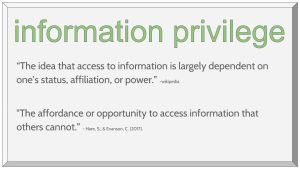Chapter 6: Information Privilege, Civic Engagement, Open Access
6.1 Understanding Information Privilege
Information Privilege is the idea that information access is based on one’s status, connection and power. This access to information can be
hindered by many factors such as geography, technology access, identity, and economic status. The types of information that are often limited are research articles and academic articles. Most colleges and universities pay to provide access to this information.
College and university libraries strive to provide robust and broad collections to support the variety of student needs and subjects studied. Those attending an institution of higher education typically have a high level of information privilege, or access to information not otherwise available to the outside public. Public libraries provide communities with access to information (and the Internet) but generally can’t afford the robust collections held at universities. This furthers an information divide.

Cost of Information
Steely Library spends nearly two million dollars a year on information access for the NKU community. Consider some of the following resources and their costs at various universities.
- At the University of North Texas, the database called Access World News was $35,960 dollars in 2015 and a subscription to the journal, American Philosophical Quarterly (for example) was $333 for the year.
There are many consequences of lacking information access. It can impact one’s skills to evaluate, locate and use information, and discern
